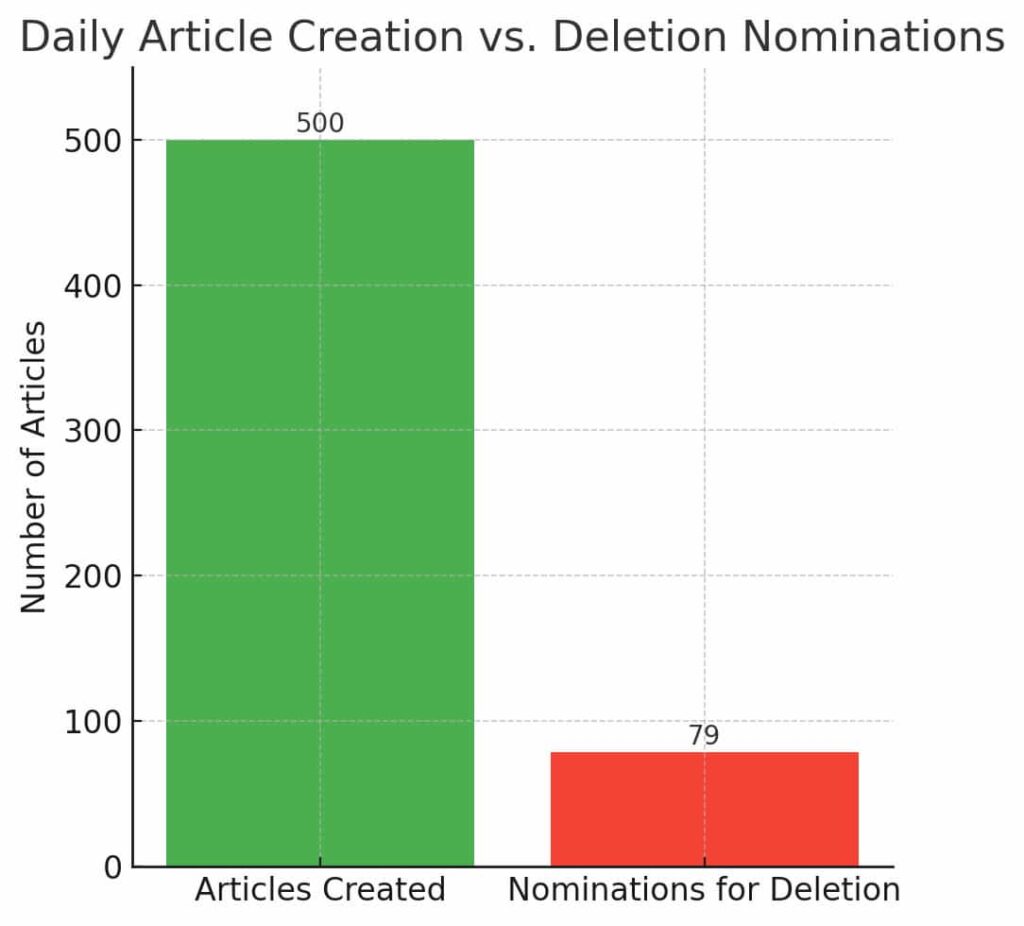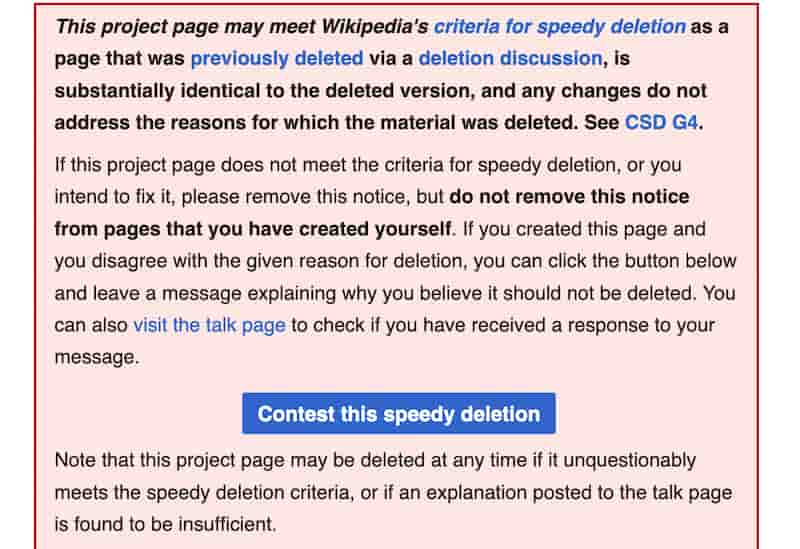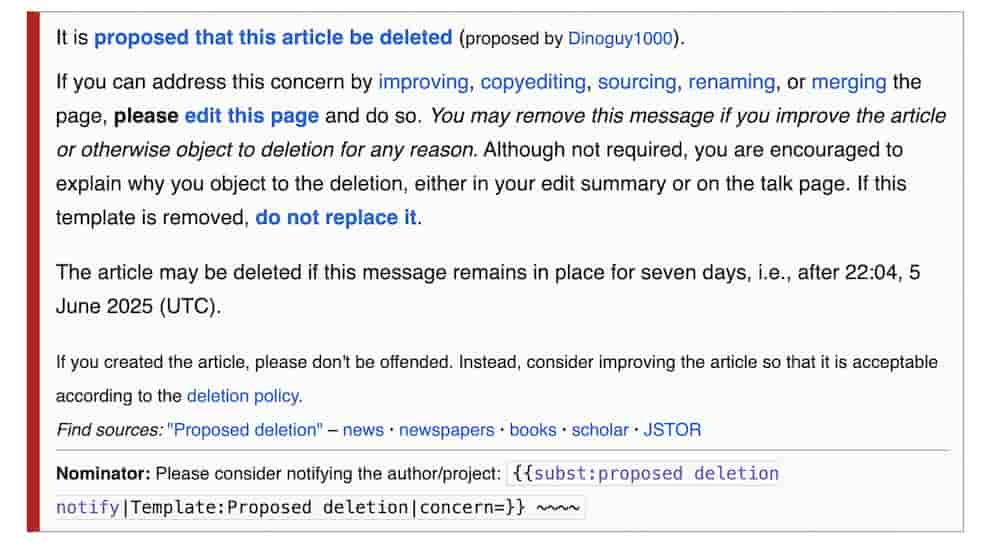What Are Wikipedia’s Article Deletion Policies?
Wikipedia’s deletion rules often create confusion because they appear both strict and unpredictable. It is like attending a social gathering without knowing the proper rules. Wikipedia maintains its credibility through these policies while avoiding biased and promotional content as well as maintaining a clear organizational structure.
The English Wikipedia receives an average of over 2 edits and more than 4,000 page views every second. As of August 2025, the English Wikipedia includes over 7 million articles and it averages around 500 new articles per day. Around 11 MB of encyclopedic text is added to the articles daily (4 GB in a year).
With this much editing activity taking place on Wikipedia, it’s no wonder that strict article deletion policies must be put into place to control this massive content flow.
The article presents Wikipedia deletion rules in simple language to explain their meaning along with their purpose and effective handling procedures. A firm grasp of these deletion rules will allow you to safeguard your Wikipedia content.
Key Takeaways
- The deletion processes on Wikipedia follow established community standards that require content to be neutral and reliable while being notable.
- The deletion process includes different procedures that operate independently of one another. The content removal process begins with Speedy Deletion for immediate removal of inappropriate material followed by Proposed Deletion (PROD) which provides objection time and Articles for Deletion (AfD) which requires extensive community discussion and consensus formation.
- The fundamental standards of Wikipedia require articles to show notability along with verifiable sources.
- The lack of robust third-party references makes an article ineligible to remain on the platform.
- Quick article removals occur when promotional language is detected in the content. The system will quickly identify content that appears like a press release or brochure for deletion.
- The main reasons articles face deletion stem from insufficient citations together with rare topics or copyright infractions.
- The deletion process operates as a vital element within Wikipedia’s broader maintenance protocols. Content merger or redirection often proves more beneficial than deletion because it allows the preservation of valuable information.
- Designing content for Wikipedia’s rules will decrease the risk of deletion through the implementation of neutrality, strong sourcing, and genuine collaboration.
The following section examines the deletion policy framework together with practical tools for managing these policies.
What is Wikipedia’s Article Deletion Policy?
Wikipedia’s deletion policy functions as the community-established method to decide which content remains and which content should be eliminated. All articles must satisfy four key criteria: quality standards, notability, neutrality requirements, and verifiability standards. The policies follow defined principles which derive from Wikipedia’s guiding foundations.
Your content will get flagged or removed if it fails to align with these standards.
Overview of Wikipedia’s Deletion Framework
Wikipedia uses three primary procedures to handle content deletion.
- Speedy Deletion: The system quickly removes entries that are clearly inappropriate such as spam content or vandalized pages and promotional pages.
- Proposed Deletion (PROD) operates as a less severe process for uncertain content because editors receive seven days to either defend or support or enhance pages marked for removal.
- Articles for Deletion (AfD) serves as the most detailed evaluation process through open debate and community consensus for content that has uncertain significance or neutrality.
For example, a small software startup founder’s article that promotes the product without third-party references will probably meet the criteria for speedy deletion. The AfD process serves articles about startups that receive minimal coverage from independent media outlets which requires editors to carefully assess their merits.
Why Deletion Policies Support Content Integrity
The purpose of deletion policies is to safeguard Wikipedia from becoming overwhelmed with advertisements and misinformation as well as weakly sourced content and spam while protecting the site from uncontrolled promotional activities. Without deletion policies Wikipedia would turn into a platform where dubious statements and biased content remain unchecked.
Each article published on Wikipedia needs reliable third-party evidence to maintain its reliability. The deletion policies function to preserve fundamental quality standards by preventing low-quality or biased content from entering the system.
The community needs to achieve consensus in order to make deletion decisions.
The community holds absolute power to decide whether content remains on AfD through their debate process. Editors use specific guidelines and policies together with examples and independent coverage to defend their position regarding article retention.
For example, a local musician’s content may fail to reach deletion standards when only the only sources presented are their website and personal blogs. Independent music magazine publications about them might lead the community to decide in favor of article retention. The final decision depends on both informed debates and consensus which protects neutrality and fairness.
Deletion as a Maintenance Tool
The removal of content serves as a fundamental maintenance requirement.
In fact, an average of 79 nominations for deletion were made per day between 2005 and 2020, for a total of 449,950 (and only 16% of them closed keep).

The Wikipedia editing team maintains the platform by removing substandard content that prevents the platform from expanding uncontrollably thus creating navigation difficulties. The platform stays both fresh and credible and useful because of this practice.
Types of Deletion on Wikipedia
Wikipedia management requires executives to understand the multiple deletion processes that exist for articles. Different approaches apply to unique situations so clear identification of these methods prevents unexpected outcomes.
Speedy Deletion
The speedy deletion process exists to eliminate content that displays clear inappropriateness such as spam articles from pasted brochures and vandalism and irrelevant single-sentence pet entries. This removal occurs rapidly because it does not require extensive discussion.

An article about your new product line which contains promotional language (“revolutionary market leader”) and lacks independent references will face quick deletion. The removal process for articles exists only through the presentation of solid evidence proving incorrect application of guidelines which generally requires independent third-party references.
Proposed Deletion (PROD)
PROD works better for uncertain cases. Consider an article about an award ceremony that receives minimal third-party attention. You should expect its deletion. Editor PROD notices activate a seven-day review period for articles. During this period anyone can protest or enhance the content through providing credible references as examples.

This procedure provides a chance to save articles instead of performing immediate removals.
Articles for Deletion (AfD)
AfD functions as the destination for difficult or disputed article deletion processes. A PROD notice from another editor initiates a seven-day discussion period where editors decide through open debate if the article should stay based on Wikipedia policies. The transparent discussions lead to fair decisions.

Other Deletion Alternatives
The removal of articles sometimes happens through merging into related entries or redirecting to broader topics while temporarily removing content until necessary fixes are completed. The merging process combines two articles that duplicate content into one unified entry which delivers improved clarity and strength.

Common Reasons for Article Deletion
The main reasons for article deletion include:
Notability Issues
The Wikipedia guidelines require independent sources to have provided substantial coverage about articles. The lack of verified independent media coverage makes your local café ineligible for Wikipedia inclusion.

Weak or Insufficient Sources
Content requires full documentation through reliable third-party references. Content that uses only website sources directly connected to the subject matter will face deletion after examination.

Promotional Tone
The use of superlatives and promotional language in an entry will lead to immediate deletion flags.

Policy Violations (Copyright/Vandalism)
The community immediately intervenes against serious violations including copyright breaches and defamatory content and “attack pages” and marketing attempts disguised as neutral information.

Participating in the Deletion Process
Wikipedia’s deletion policies appear complicated at first but remain straightforward for anyone to handle.
Nominating Articles
- Show which deletion criteria the content fails to meet.
- Use proper templates ({{db-advert}}, {{subst:prod}}) citing Wikipedia rules explicitly.
- Politely notify original article authors regarding decisions.
Defending Articles
- The quick addition of independent references helps prove notability in articles.
- Transform promotional language into factual information presented in a neutral manner.
- State policy-backed arguments respectfully on AfD discussion pages.
Engaging Constructively
Learning how to effectively defend your edits is imperative, especially since you will be dealing with veteran editors that have a strong presence on Wikipedia. In fact, although over 160,000 users have spoken up in AfD discussions, over half the debate comments were made by only 1,218 users. This shows how a core group within Wikipedia shapes decisions.
- Discussions should remain focused on policy instead of emotions.
- Propose different actions (mergers or redirects) when you believe deletion is too severe.
- Community-backed decisions should be relied upon instead of personal assumptions.
Relationship to Wikipedia’s Maintenance Practices
The act of deletion operates as an integral part of Wikipedia’s maintenance procedures. Several critical tasks form the backbone of Wikipedia operations:
- Regular editors spend their time enhancing entries through reliable source additions and ensuring neutrality while performing regular cleaning operations.
- New editors face flagging at first before getting an opportunity to fix their problems instead of experiencing immediate removal.
Conclusion
Your efforts on Wikipedia should match its core values which include maintaining neutral information and building credibility through genuine collaboration. Your success depends on creating well-balanced articles with thorough documentation that matches established standards instead of trying to manipulate the system. Correct implementation enables you to safeguard your creations while adding substantial value to worldwide collective knowledge.
Tags: Wikipedia.
